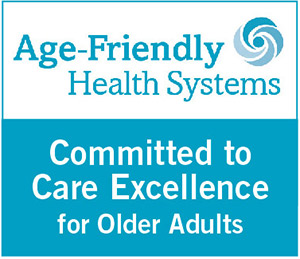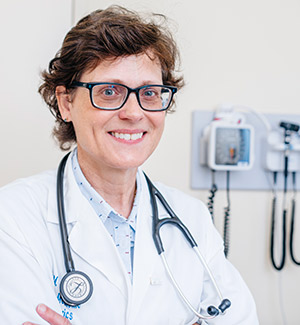UCI Medical Center named an age-friendly health system

UCI Medical Center recently received national recognition for excellence in caring for older hospitalized patients.
The medical center's Inpatient Care Unit received the Age-Friendly Health System — Committed to Care Excellence award, the highest designation bestowed by the Institute for Healthcare Improvement (IHI) in partnership with the John A. Hartford Foundation, the American Hospital Association and the Catholic Health Association of the United States.
IHI previously awarded this Level 2 designation to UCI Health for its outpatient primary care services and a Level 1 designation for the medical center's Emergency Department, both in recognition of their commitment to healthcare excellence for older adults.
“This recognition for UCI Health is exciting because it shows that we demonstrate a commitment to the highest level of care for seniors,” said Dr. Lisa Gibbs, professor and chief of the UCI School of Medicine’s Division of Geriatric Medicine & Gerontology and director of the UCI Health SeniorHealth Center.

“All our programs promote clinical excellence and the advancement of the highest level of care for seniors,” said Lisa Gibbs, MD, director of the UCI Health SeniorHealth Center and a professor and chief of Geriatric Medicine & Gerontology at the UCI School of Medicine.
"It means we are focused on providing a continuum of age-friendly care for patients in all our clinical settings, including the outpatient, inpatient and emergency room sites of care.”
The UCI Health geriatric medicine program is regularly recognized among the top 50 in the country in annual best hospitals rankings by U.S. News & World Report. The SeniorHealth Center was among the nation's first patient-centered medical homes for geriatric care. The Division of Geriatric Medicine & Gerontology, which has been designated a Center of Excellence in Elder Abuse, has long been an advocate for improving the health of older adults and training future physicians to meet the needs of this growing population.
The number of people age 65 and older is projected to nearly double in 30 years — from 43 million in 2012 to an estimated 83 million in 2050, according to U.S. Census data.
Along with this increased life expectancy, the population of older adults with multiple chronic conditions is projected to rise, posing challenges for the nation’s healthcare systems at a time when there is a shortage of doctors trained to care for them.
Becoming age-friendly
UCI Health is one of only five centers in Orange County to receive the age-friendly designation from IHI, an independent nonprofit organization founded in 1991 to improve healthcare practices.
To earn the recognition, all three UCI Health units — outpatient primary care, inpatient care and the emergency department — went through a rigorous process of screening and assessing patients ages 65 and older using evidence-based criteria. They submitted their data along with action plans for care to IHI, which approved the plans and certified each of the programs as Age-Friendly Health System Participants (Level 1).
Next, each team gathered and submitted three more months of data on patients who had received the approved care. Level 2 status as an Age-Friendly Health System is granted once IHI reviews and approves the action plans’ implementation. The emergency department is expected to achieve Level 2 designation soon, Gibbs said.
IHI defines an age-friendly health system as one in which the care of every older adult is guided by a set of evidence-based practices to organize care with a focus on an older adult’s wellness and strengths rather than solely on a disease. These practices, called the "4Ms," are:
- What Matters: This practice, the most important “M,” aligns care with what matters most to each patient. Providers ask them to identity what matters most in their life and health, and what they want from their healthcare.
- Medication: This practice is aimed at preventing polypharmacy, or too many medications, which may result in side effects as well as unintended drug interactions that affect cognition and memory, increase the risk of falls, insomnia and other conditions.
- Mentation (mental activity): Providers monitor patients to prevent, identify and treat any symptoms of dementia, depression or delirium.
- Mobility: Providers strive to ensure that older adults are able to move safely, maintain daily functions and can do what matters most in their lives.
The 4Ms also increase patient satisfaction and lead to better health outcomes, resulting in lower costs for patients and increased cost-effectiveness for hospitals and healthcare practices, according to IHI.
What matters is key
At the UCI Health SeniorHealth Center, patients are always asked, if you could change one aspect of your healthcare, what would it be?
“This is one of the most important questions we ask during an annual wellness visit,” said Gibbs, because it prompts a discussion about what matters most to each patient. It also helps the provider outline realistic healthcare goals.
“The answer can be as simple as a patient who wants to be able to walk her dog again because it brings her joy,” she added.
With this information, the patient and provider can develop a plan for managing the patient’s arthritis so that she can walk her dog for 10 minutes a day. It may also mean reviewing medications to ensure that they are age-friendly and don’t interfere with the patient’s mobility or cause cognitive impairment.
Moreover, Gibbs noted, evidence shows that when you include patients, their families and caregivers in healthcare decisions, it’s more likely that their healthcare goals will be met.
Committed to senior care
These values are part of the DNA of the UCI Health SeniorHealth Center, which offers a wide range of services to meet the needs of aging adults and their families, including:
- Primary care designed specifically for adults age 60 and older. Physicians provide preventive healthcare and treatment for acute and chronic illness. Patients can meet with a geriatrician for ongoing care or a consultation about specific health concerns.
- Specialized care for geriatric syndromes such as memory loss, falls, frailty, urinary incontinence or functional decline.
- Specialty services, including:
- Health Assessment Program for Seniors (HAPS), a comprehensive assessment for older adults with complex health concerns. A multidisciplinary team reviews the assessment results and assembles an individualized plan of support for the patient and their caregivers.
- Memory Assessment services. For some individuals, minor issues such as misplacing items can just be annoying, but for others memory problems may interfere with daily living. Early identification of dementia is important for optimal health and welfare. The memory assessment team works to identify and address memory complaints and contributing factors.
- Falls assessment services. For those who have experienced falls, or are at risk for falling, this service evaluates what places individuals at risk and makes recommendations for optimal health and falls prevention.
- Geriatric oncology assessments. For those who are undergoing treatment for cancer, our team reviews issues such as medications and side effects, maintaining function, quality of life, optimizing health and advance care planning.
The Division of Geriatric Medicine & Gerontology is also committed to building a future healthcare workforce so that older adults receive the care they deserve. With a grant from the U.S. Health Resources and Services Administration (HRSA), the division's Geriatric Workforce Enhancement Program (GWEP) trains healthcare workers to maximize engagement with geriatric patients and their families. It also seeks to train future doctors and integrate geriatric medicine into primary care practice.
Two GWEP initiatives have already emerged:
- A mobile-friendly dementia care website for healthcare practitioners developed by UCI Health geriatric medicine specialists led by Dr. Steven Tam in partnership with Alzheimer’s Orange County.
- Free, virtual geriatric education classes for healthcare professionals that also provide continuing medical education credits. The most recent series covered mental and emotional issues facing older adults. A new series beginning June 11, 2021, will address “Chronic Diseases in Older Adults.”
”All our programs promote clinical excellence and the advancement of the highest level of care for seniors,” said Gibbs. ”The future of healthcare for seniors depends on innovations such as team-based care, telehealth and remote patient monitoring, as well as a unique understanding of the transitions people face in their later years that affect health and well-being. We aim to promote optimal living and empowered longevity.”
For more information about the geriatric medicine classes, contact geroecho@uci.edu.
The UCI Health system is the clinical enterprise of the University of California, Irvine. Patients can access UCI Health at primary and specialty care offices across Orange County and at its main campus, UCI Medical Center in Orange, California. The 418-bed acute care hospital, listed among America’s Best Hospitals by U.S. News & World Report for the 20th consecutive year, provides tertiary and quaternary care, ambulatory and specialty medical clinics, and behavioral health and rehabilitation services. UCI Medical Center is home to Orange County’s only National Cancer Institute-designated comprehensive cancer center, high-risk perinatal/neonatal program and American College of Surgeons-verified Level I adult and Level II pediatric trauma center and regional burn center. UCI Health serves a region of nearly 4 million people in Orange County, western Riverside County and southeast Los Angeles County. Follow us on Facebook and Twitter.




